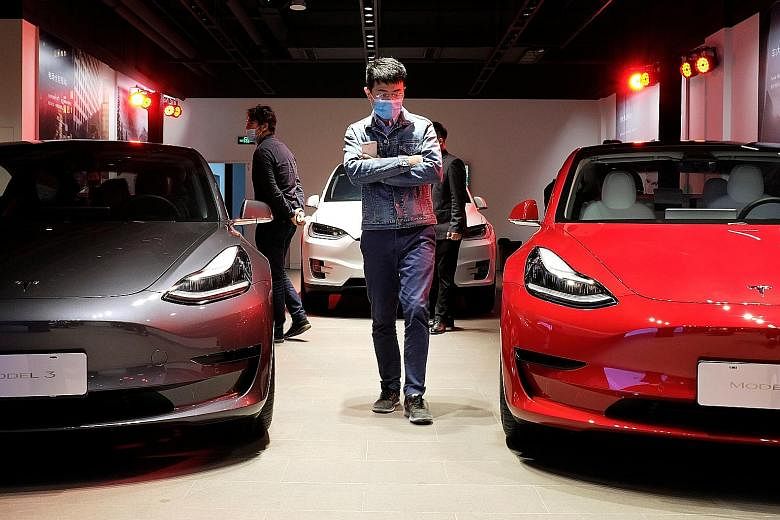SHANGHAI • Tesla's new Shanghai plant has churned out popular Model 3 sedans for the past six months, catapulting the company to the top of the electric car sales chart and piling pressure on cash-strapped local rivals.
There was another casualty last week. Byton is at least the third sizeable electric vehicle (EV) upstart to throw in the towel since Mr Elon Musk started his made-in-China offensive, after Bordrin Motors and Jiangsu Saleen Automotive Technology wound their operations down earlier this year. They fell victim to plummeting demand amid the trade war and coronavirus pandemic, and as the government scaled back subsidies that turned China into the world's biggest EV market with hundreds of producers.
Yet Tesla, in just half a year, grabbed a hefty slice of that shrinking pie - and its portion keeps getting bigger. The market leader's sales now approach a quarter of the total tally for EVs, the China Passenger Car Association (PCA) said on Wednesday, as wealthier buyers are drawn to Tesla's brand cachet.
That is making life difficult for the slew of local contenders and risks exposing the multibillion-dollar Chinese EV push as a bubble.
"It is more and more difficult for EV start-ups to raise funds," said PCA secretary-general Cui Dongshu. "New-energy vehicles have not yet been popularised on a large scale - so it is like the situation where there is not enough food in the temple, and some of the monks are forced out."
The Chinese government infused massive amounts of money into the alternative-energy vehicle sector over the past two decades, persuading foreign carmakers, such as Tesla and Volkswagen, to start manufacturing EVs in the country.
A market that was initially dominated by local companies became more competitive. At one point last year, there were almost 500 EV manufacturers registered in China.
Chinese electric car maker NIO Inc founder William Li foresaw the local contenders' predicament two years ago. In an internal meeting in May 2018, Mr Li predicted that Tesla, managing to set up production in China within three years, would trigger the demise of many local rivals, according to people familiar with the matter.
NIO declined to comment.
About 18 months later, the first Teslas rolled off the United States company's assembly line in Shanghai. Monthly Tesla registrations in China now exceed 10,000 and helped the company beat global delivery estimates in the latest quarter.
-
Tesla 'very close' to developing fully driverless vehicles
-
SHANGHAI • Mr Elon Musk's Tesla is "very close" to developing fully autonomous vehicles and could work out the basics of that technology as soon as this year, he said in a pre-recorded video played during the World AI Conference in Shanghai.
Mr Musk reiterated that the electric vehicle maker has solved most of the essential challenges towards achieving Level 5 autonomy, or a fully self-driven automobile that needs no human behind the wheel. The Tesla and SpaceX chief was reaffirming a goal first expressed last year.
"I'm confident that we will have the basic functionality of L5 autonomous driving this year," he said. "There are no fundamental challenges."
Tesla is racing against the likes of Alphabet's Waymo and General Motors' Cruise to attain the pinnacle of the industry: the first 100 per cent driverless car. The coronavirus pandemic has both strengthened the case for robot drivers - by making social distance essential - and shuttered labs and factories where the technology is being refined.
Mr Musk has argued autonomous driving will be transformative for Tesla. At stake are billions of dollars in potential revenue and a global change in traffic systems. Bloomberg expects 27 million robotaxis on the road globally by 2040, while Cruise chief executive officer Dan Ammann has claimed there will be a US$1 trillion (S$1.39 trillion) addressable market in the US for autonomous ride hailing. Waymo - seen as a front runner to pioneer a commercial service - has been valued at more than US$100 billion.
Tesla customers already use Autopilot on a regular basis, though the technology, which is only semi-automatic, has been linked in the past with accidents that the company has attributed to human error.
BLOOMBERG
Many start-ups' troubles worsened last year, while Tesla constructed its facility.
Out of about 100 Chinese start-ups developing electric cars, a diminishing group of just 11 succeeded in raising funds last year, according to Mr Bill Russo, founder and chief executive of Automobility in Shanghai.
The total haul of 27 billion yuan (S$5.4 billion) was split between NIO, Lixiang Automotive, Byton, WM Motor Technology, Xpeng Motors Technology, Bordrin, Enovate Motors, Aiways Automobile, Singulato Motors, Leap Motor and Hozon New Energy Automobile, according to Automobility.
Byton and Bordrin succumbing to market realities so soon after their latest fund-raising rounds shows the cut-throat nature of the capital-intensive business.
Sales of new EVs fell 35 per cent to 85,600 units last month, PCA said.
China Evergrande Group, the indebted property developer that is expanding to EVs, in March reiterated a pledge to become a powerful player in the auto industry even as losses at the business swelled and its first product was delayed.
The start-ups already selling - companies such as NIO, WM Motor and Xpeng - are in a relatively better position than those that are not as far along with product development, PCA's Mr Cui said. NIO, which secured US$1 billion (S$1.4 billion) in additional funds from a regional government this year, sold a record 3,740 vehicles last month.
But he noted that start-ups that have yet to offer a product are at the biggest risk of suffering.
"There are too many EV companies chasing too few customers with constraints on capital," Automobility's Mr Russo said. "Consolidation is inevitable."
BLOOMBERG

